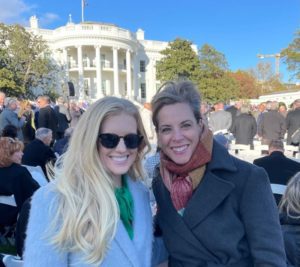February is Black History Month! Join us in celebrating some of the Black environmentalists, advocates and thought-leaders who have championed work to protect our public lands and increase equity and access in the outdoors.
Continue readingOutdoor Industry Business Certificates
Greetings from the White House — Letter from OIA Executive Director Lise Aangeenbrug

On Monday, I joined President Joe Biden and a group of bipartisan lawmakers and business leaders at the signing of the Infrastructure Investment and Jobs Act. I’m proud to say that OIA has been a key player every step along the way, ensuring that meaningful climate provisions and other projects important to our industry were included in this new law. We should be encouraged by its many provisions to mitigate the impacts of climate change, including wildfires, droughts and floods; to expand access to and improve our nation’s parks and trails; and to enhance our nature-based infrastructure.
Just as importantly, this bill will provide long overdue improvements to America’s core infrastructure – roads, bridges, ports and airports – which will help our $689 billion industry and 4.3 million employees deliver our products to consumers and connect people with parks and green spaces.
But our work is not done yet. As Congress continues to work on budget reconciliation, OIA is committed to working with lawmakers and the Biden administration to ensure that additional climate priorities – like funding for the Civilian Climate Corps, climate resiliency projects, outdoor restoration projects and the Department of Interior – are properly supported in the Build Back Better Act.
OIA’s advocacy and policy work would not be possible without the support of our members. Thank you for your continued engagement, and please do not hesitate to reach out about our policy priorities
Together We Are a Force,
Lise Aangeenbrug
OIA Executive Director
Webinar: Image Copyright 101 and Best Practices
Winners Announced: 2021 Path to Positive (P2P) Climate Leadership Awards
We’re thrilled to announce the winners of the 2021 Path to Positive (P2P) Climate Leadership Awards, which recognize Climate Action Corps members who stand out in the categories of transparency, partnership, community and impact. These companies demonstrated unique and influential climate leadership that ultimately increased our collective impact in 2020, and we applaud their standout commitment to the Corps and leadership within our industry.
TRANSPARENCY AWARD: KLEAN KANTEEN
The Transparency Award recognizes the member organization that has creatively and authentically pushed the boundaries of honest storytelling about their climate journey to inspire action by consumers, employees, peers or/and other key stakeholders.
As a family-and employee-owned company, Klean Kanteen has long prioritized environmental stewardship and robust sustainability assessments–in particular, through rigorous third-party standards and organizations like Climate Neutral, B-Corporation, and 1% For the Planet to ensure credibility to the market and confidence to its customers. Yet beyond looking to labels and certifications, Klean Kanteen leans in further to better understand its impact and opportunities by measuring impact across its entire business, manufacturing processes and product, most notably by using lifecycle Assessment (LCA) tools and its own primary data from facilities for detailed greenhouse gas emissions (GHG) measurement–a challenging effort that’s further rewarded by their ability to leverage this insight to make informed decisions that mitigate impact.
“We are honored and humbled to be the recipient of this year’s P2P Climate Leadership Award in the category of Transparency. We are grateful for the work of the OIA Climate Action Corps and the resources it provides for companies to take bold, meaningful action. We know avoiding the worst impacts of climate change will require companies big and small to be all in, and hope by sharing our own experiences, other brands will be encouraged to take risks, accelerate their own climate journeys, and engage in authentic and honest storytelling.” – Danielle Cresswell, Senior Sustainability Manager, Klean Kanteen
By relying on credible standards and the best available data in its storytelling efforts, while building an accessible narrative that addresses their findings, learnings and opportunities to improve (see for yourself on their website and Annual Brand Impact Report), Klean Kanteen paves the way in honest storytelling. Further, they consistently inspire their fellow Climate Action Corps member companies by sharing this insight honestly and openly through the Corps’ online community platform, virtual trainings and written case studies. It’s this combination of contributions that truly push the bounds of the type of transparency that’s critical to drive real, measurable climate action the world needs, and we applaud Klean Kanteen for their leadership.
PARTNERSHIP AWARD: NEMO EQUIPMENT & DAC
The Partnership Award recognizes the member organization with a shining example of enduring value chain partnership, particularly supplier-brand, that is innovative and replicable.
Collaborative efforts across the supply chain that can both reduce emissions and be scaled effectively are paramount for meeting our ambitious and collective climate goals. It’s here where a unique, decade-long partnership sits amongst brand NEMO Equipment and supplier partner DAC, who together have steadily built an authentic relationship in their years of innovating on tent pole construction.
Leveraging this foundation, NEMO discovered an opportunity to further innovate in its shipping and packaging systems by working together to eliminate the polybag for their tent pole sets, which had been historically used alongside a conventional polyester fabric bag. In no time, the two designed and sourced a single fabric bag solution made of Repreve® recycled, undyed and uncoated fabric and recycled thread, using less energy and water to produce. Additionally, no webbing, cord, or plastic hardware was used in the design, minimizing material impacts and creating a straightforward solution.
“NEMO is honored to accept this Climate Leadership Award alongside DAC. We believe that collaboration accelerates progress, and we look forward to doing more work with the Climate Action Corps.” – Theresa Conn, Global Distribution & Sustainability Manager, NEMO Equipment
While this project will save 100,000 polybags within the first two years for NEMO, it’s the potential ripple effect amongst DAC’s other brand partners that holds promise for an even greater impact to come. We congratulate NEMO and DAC on their ability to leverage their long-term partnership not only for their own gain but, more importantly, unlock solutions for the industry at large. For more information, see the Plastic Impact Alliance’s member spotlight on NEMO’s program.
COMMUNITY AWARD: TROY JONES, SPECIALIZED
The Community Award recognizes the individual person that has frequently engaged and contributed to the Climate Action Corps community to bolster collective knowledge to its fullest potential.
Leaders, companies, and industries all go further when they work together – and nevertheless, are often driven by individuals working within who wield their influence and truly bring others along. As a co-chair for the PeopleForBikes (PFB) Sustainability Working Group and co-lead for their Social Environmental Supply Chain Track, Troy Jones exemplifies an individual walking the walk on community building and recognizes relationships as a critical lever for change.
With a vast knowledge base and experience of issues in the bike supply chain, Troy is continually willing and humble to help in service of the big vision of the bike industry moving forward and together on climate action. Whether it’s through time spent on bi-monthly working group calls and climate presentations, or informal one-on-one calls and messages to connect personally, it’s his inclusive and light-hearted approach in helping his peers, and even competitors, that collectively helps demystify climate action and inspires others to join in.
In an industry ripe with competition, Troy’s commitment to personally model pre-competitive collaboration is exceptional and shows the courage needed by all leaders looking to accelerate climate action within their own industry and beyond.
“The bicycle has the power to positively impact the health of people and the planet. At Specialized, we’ve learned that creating connections across our industry will not only help encourage more trips on two wheels, but promote greater responsibility in the lifecycle of products we all bring to riders. It’s been an honor to help lead the initiatives that enable the cycling community to make progress on these critical issues.” – Troy Jones, Social and Environmental Responsibility Manager, Specialized
IMPACT AWARD: BURTON
The Impact Award recognizes the member organization that has taken notable actions to drive big impact, particularly GHG emissions reduction, in line with the Climate Action Corps Guiding Principles of Make Better, Transport Smarter, Run Cleaner and Grow Creatively.
The systemic transformation that’s required to meet the global targets outlined by the scientific community necessitates companies taking a broad look at their footprint – taking responsibility for impacts beyond their own business and factories to reach their global supply chain, customers and legislators. With a strong footing in reductions and advocacy, Burton stands out as a front-runner in playing a positive role to driving broader impact.
Early on, Burton focused in on its carbon footprint and set goals for its scope 1 and 2 emissions that encompassed Burton’s three largest office facilities globally: Burlington, Vermont, United States; Innsbruck, Austria; Tokyo, Japan. While they reportedly missed this goal by eight percentage points, they still reported a strong reduction of 12% on these emissions in 2020 compared with a 2012 baseline.
As for scope 3, they set their sights on an average per unit carbon reduction target of 20% in the Winter 2022 product season as compared with Winter 2017, for all hardgood product categories and remarkably, met (and exceeded) their ambitious goal in one product category: snowboards. By making key changes like switching to a bio-based resin, eliminating the lacquer on the board, and installing solar on factory rooftops overseas (an onerous challenge), they achieved the 21% reported reduction per unit of snowboards in the Winter 2022 product season compared with a Winter 2017 baseline.
While they didn’t meet all of their reduction goals and even increased in some product categories due to design changes needed for increased functionality, their successful example illustrates the important work to Make Better and Run Cleaner to reduce the largest and toughest source of emissions in the supply chain. We congratulate Burton on this incredible achievement and their ambition to continually improve, season after season.
[panini-column ]
[panini-column alignment=”align-center”]
[paniniblock template=”basic/html” attribute-data=”name:template;type:text;label:Block”]
[content name=”html” label=”Raw HTML”]

Bee Hui Yeh
Founder & Principal, The Power of We
[/content]
[/paniniblock]
[/panini-column]
[panini-column ]
[paniniblock template=”basic/html” attribute-data=”name:template;type:text;label:Block”]
[content name=”html” label=”Raw HTML”]

Erin Callahan
Director of Corporate Engagement, RMI
[/content]
[/paniniblock]
[/panini-column]
[panini-column ]
[paniniblock template=”basic/html” attribute-data=”name:template;type:text;label:Block”]
[content name=”html” label=”Raw HTML”]

Eliot Metzger
Director of Sustainable Business & Innovation, WRI
[/content]
[/paniniblock]
[/panini-column]
[panini-column ]
[paniniblock template=”basic/html” attribute-data=”name:template;type:text;label:Block”]
[content name=”html” label=”Raw HTML”]

Andrew Winston
Sustainability Expert and Author
[/content]
[/paniniblock]
[/panini-column]
[/panini-row]

Need more info? Download the Climate Action Corps Field Guide.
Ready to hit the trail towards climate positive?Join us today.








